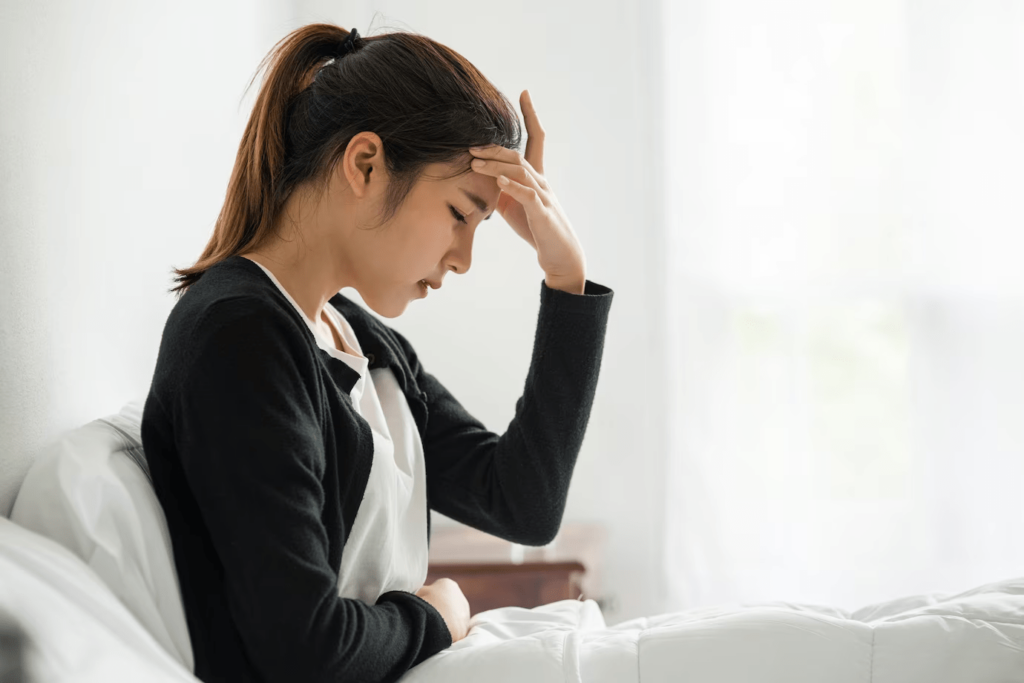 Benzodiazepines can cause dependence within weeks of using them, even when taken correctly. Many people who struggle with benzo addiction, characterized by compulsive use of benzodiazepines, start with a legitimate prescription. People can easily become addicted and left with loss of their former selves.
However, there’s hope. Recovery from benzo addiction is possible. We can help you understand how addiction to benzos happens, how these drugs work, and how you can get much-needed relief. In this post, we’ll explain benzo addiction treatment and how NuLife can help you find recovery from benzo addiction through our treatment programs.
Benzodiazepines can cause dependence within weeks of using them, even when taken correctly. Many people who struggle with benzo addiction, characterized by compulsive use of benzodiazepines, start with a legitimate prescription. People can easily become addicted and left with loss of their former selves.
However, there’s hope. Recovery from benzo addiction is possible. We can help you understand how addiction to benzos happens, how these drugs work, and how you can get much-needed relief. In this post, we’ll explain benzo addiction treatment and how NuLife can help you find recovery from benzo addiction through our treatment programs. What are Benzodiazepines?
Benzodiazepines, often called “benzos,” are anxiety-reducing and sedative medications. This means that they slow down the body and brain activities and help you feel calmer when you feel intense anxiety or fear.
Examples of Benzodiazepines
- Alprazolam (Xanax)
- Clonazepam (Klonopin)
- Diazepam (Valium)
- Chlordiazepoxide (Librium)
- Flurazepam (Dalmane)
- Lorazepam (Ativan)
Xanax, Klonopin, Valium, and Ativan are the most commonly prescribed benzos in the US. But while Ativan and Xanax are short-acting, Klonopin and Valium are longer-acting.
How Do Benzodiazepines Work?
Benzodiazepines (benzos) work by calming the brain. Benzos do this by helping a natural chemical in your body called GABA (gamma-aminobutyric acid) work better. GABA’s job is to slow down brain activity (such as reasoning, memory, and emotion), making you feel relaxed and less anxious.
Benzodiazepines boost GABA’s effect on your brain and body, which can help:
- reduce anxiety
- help you sleep
- relax muscles
This set of prescription drugs treat conditions like anxiety, insomnia, and muscle spasms. They are also used to sedate patients during surgery. Benzos are commonly prescribed for treating panic disorder.
However, they can also cause side effects like drowsiness, muscle weakness, memory problems, and slurred speech.
Benzodiazepine Addiction and Abuse
Benzo addiction happens when someone develops a physical dependence on these medications. When a person is dependent and can’t stop using benzos, no matter how harmful the consequences are, they need treatment for benzo addiction.
Another health issue involved in all drug addiction is withdrawal. Withdrawal makes it physically painful to stop using. To quit using benzos abruptly, or “cold turkey,” is very dangerous and can cause seizures.
More so, due to their widespread availability, people misuse benzodiazepines. They’re one of the most commonly abused substances. Some take it with alcohol or substances like opioids. Others inject, snort, or smoke the drug.

Signs and Symptoms of Benzo Addiction
While some people take benzos, like Xanax, for legitimate reasons. Even though benzos are prescribed there is also the potential for abuse. Abruptly stopping the benzodiazepines can also cause benzo addiction withdrawal, may result in life-threatening symptoms.
If you believe you or your loved one might be struggling with benzo addiction, here are some signs and symptoms you should look for.
- Taking More Than Prescribed: Taking more benzos than your doctor prescribed is often a sign of addiction.
- Craving: Craving means intensely wanting the medication even when you don’t need it for your health.
- Changes in Daily Habit: If you start to skip school, work, or other important things because of your benzos use or cravings, that’s a sign of addiction.
- Social Isolation: People with a benzo addiction avoid friends and family.
- Tolerance: Over time, someone might need higher doses to get the same effect they used to get with lower doses. They might also mix it with alcohol and other substances.
- Physical Symptoms: Someone addicted to benzos might feel anxious, have muscle weakness, headaches, or trouble sleeping.
- Loss of Interest: People with benzo addiction might lose interest in things or hobbies they used to enjoy, such as singing, dancing, reading, talking with people, etc.
- Cognitive Symptoms and Mood Swings: Even when benzos are causing problems in their life, poor concentration, memory difficulties, anger, and depression, they keep using them.
- Doctor Shopping: Some people with addiction go to different doctors to get more prescriptions. People also fake symptoms to get prescriptions from their doctors.
What Causes Benzodiazepine Addiction?
Experts suggest that genetic and external factors contribute to why a person is addicted to benzodiazepines. These influences are:
Genetics
Genetic factors can play a role in a person’s susceptibility to addiction. Studies have shown that people with family members struggling with substance addictions are more vulnerable or at risk of developing substance addictions.
External Factors
Environmental influences can contribute to addiction. This means exposure to a social circle where drug use is rampant or easy access to benzodiazepines can make you susceptible to addiction to drugs and alcohol. High stress levels can cause someone to seek a prescription for benzodiazepines.
But these same high stress levels can also cause a person to misuse the drug, resulting in addiction. People who have gone through trauma and having difficulty coping are also more likely to get addicted to benzodiazepines. They may take the drug to numb the agony of the trauma.

Short- and Long-Term Side Effects of Benzo Addiction
Benzodiazepines, often prescribed to relieve anxiety, insomnia, and muscle spasms, can be helpful when used correctly. But when misused or taken for a long time, they can lead to addiction and a range of troubling side effects. These side effects can vary in severity and may worsen as the addiction progresses. Here are some common side effects of benzodiazepine addiction over the short-term and long-term:
Physical Side Effects of Benzo Addiction
Physical Health Issues: Chronic use of benzodiazepines can lead to physical health problems such as
- dizziness
- blurred vision
- headaches or coordination difficulties
- respiratory issues
- gastrointestinal problems
Withdrawal Symptoms: When a person struggling with benzodiazepines tries to reduce or stop their use without professional medical help, they can experience withdrawal symptoms that include:
- anxiety
- restlessness
- insomnia
- muscle tension
- dizziness
- shortness of breath
- sleeping problems
- sweating
- in severe cases, seizures.
Increased Risk of Accidents: Due to the sedative effects of benzodiazepines, individuals may be at a higher risk of accidents, including falls and car crashes.
Psychological Side Effects of Benzo Addiction
- Cognitive Impairment: This means benzodiazepine addiction can make you forget things, lose concentration or balance, and think slowly.
- Mood Changes: Benzo addiction can cause you to easily irritate and experience erratic mood swings. It may also worsen other underlying mental health conditions like depression.
- Toll on Mental Health: In some cases, benzodiazepines can have the opposite effect on your mental health than what it is prescribed for. Benzo addiction may cause increased anxiety, hallucinations, delusion, nightmares, agitation, or aggression.
Social and Behavioral Side Effects of Benzo Addiction
- Relationship Problems: Benzodiazepine addiction can strain relationships with family, friends, and colleagues due to changes in behavior and priorities.
- Isolation: Benzo addiction may cause to you withdraw from social activities and can lead to isolation.
- Financial and Legal Issues: Maintaining a benzodiazepine addiction can be expensive, leading to financial difficulties as your tolerance increases. Many people find themselves turning to non-prescribed sources for their benzos. Additionally, getting benzodiazepines without a prescription leads to legal problems.
- Neglecting Responsibilities: Someone with Benzo addiction may neglect crucial responsibilities such as work, school, or childcare due to their addiction.
It’s important to note that not everyone who uses benzodiazepines will experience addiction or all of these side effects. The severity of addiction and its impact on an individual’s life can vary widely. That’s why it’s essential to recognize these signs early and to seek help from a healthcare professional or addiction specialist.

Dual Diagnosis Treatment
People with mental health conditions, especially anxiety disorders, may abuse benzos to suppress their disorder. Sometimes, that involves doctor shopping or buying benzos on the street. Prolonged or excessive use of benzodiazepines may aggravate depression and other mental disorders.
Dual diagnosis treatment, such as the therapy offered at NuLife Behavioral Health, is necessary when substance addiction and mental illnesses exist together.
Benzo Addiction Treatment
While benzo addiction can be uncomfortable, especially when you want to stop using or are experiencing benzodiazepine withdrawal, know that you are not alone in your treatment for benzo addiction. NuLife Behavioral Health offers personalized treatment plans that can help increase your chances of recovery medically and professionally.
Benzo Addiction Treatment Centers
If you’re in Chicagoland and think you or a loved one might have an addiction to benzos, you may have questions such as where benzo treatment centers are located and what kind of treatment you can get at a benzo rehab center.
At NuLife Behavioral Health Innois, we offer individualized treatment plans services such as:
Partial hospitalization treatment: allows you to get intensive therapeutic support during the day, then return home or to sober living environments at night. Your nights and weekends are free.
Intensive outpatient treatment: An intensive outpatient program requires less of a time commitment than partial hospitalization. NuLife Behavioral Health’s intensive outpatient program lets you stay at home and continue to receive outpatient drug rehab. Intensive outpatient makes it easy to continue your day-to-day activities such as work, school, or childcare.
Outpatient treatment: This program allows you to participate in therapy sessions and group meetings during the day and then return home at night. This setup also provides a supportive environment for recovery without having to stay away from work or family commitments.
Therapy and support groups: Therapy can help you learn healthier ways to cope with stress and anxiety. At NuLife Behavioral Health, you can receive group and individual therapy. During individual therapy sessions, you’ll work one-on-one with a therapist to address your needs. Group therapy offers the support of peers as you work through treatment.
Transcranial Magnetic Stimulation therapy (TMS) is an evidence-based, FDA-approved non-invasive treatment for disorders often accompanying benzo addiction, including PTSD, anxiety, depression, and obsessive-compulsive disorder. TMS uses powerful, focused magnetic fields to stimulate groups of nerves within the brain that are underactive or inactive. TMS sessions take place on an outpatient basis and require no downtime. A person can have a TMS session and return to their daily routine.
Medication-Assisted Treatment (MAT).
Support groups: NuLife Behavioral Health treatment facility in Chicago offers support groups. They can help involve your loved ones in your treatment and recovery. You’ll also meet others facing similar challenges, share your experiences, and gain valuable insights and encouragement.

KEY TAKEAWAY:
Benzodiazepine addiction treatment is a journey that can lead to a brighter, drug-free future. It’s not always easy, especially when paired with mental health conditions. But with proper evidence-based substance abuse treatment, support, and determination, it is possible. At NuLife Behavioral Health in Illinois, we’ve got the treatment to support you. Our tools help you to break free from benzo addiction and start a new chapter in life.

Get Started at NuLife Behavioral Health Illinois
The PHP at NuLife Behavioral Health Illinois is just one of the many levels of care that we offer. If you or your loved one is struggling with a mental health concern or a substance use disorder, our team is here to help.
Call us today at 844.383.0626 or reach out online to learn more about how we can help you begin the path to a new life.


